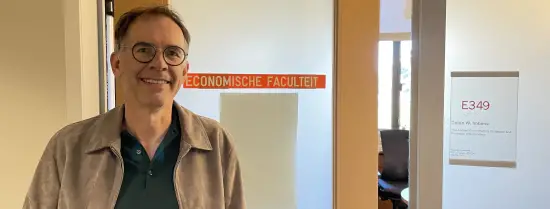It was two o’clock in the morning when the phone rang at Guido Imbens’ home in California; the screen showed someone was calling from Sweden. Within a minute, everything changed for the Dutch/American professor who had grown up near Eindhoven. The call confirmed: he had won the 2021 Nobel Prize for Economic Sciences, sharing the award with his friends David Card and also best man at his wedding, Joshua Angrist.
There was no time to lose. The news would be announced shortly at a press conference in Stockholm and the world would learn about the honour. Guido and his wife had half an hour to wake their children, tell his brother and sister in the Netherlands and get ready; a film crew from Stanford University was already on its way.
“My sons and daughter helped out by answering the phone and dealing with emails, they even made scrambled eggs and pancakes for our visitors,” he recalls. “Then the three of them interviewed me in the garden for a video, encouraging me to explain my research in simple terms; it’s now very popular on YouTube. I have precious memories of being with Susan and the kids that morning, it was really special.”
The Nobel Prize recognised Guido’s achievements in drawing new meanings from statistics, through a branch of economics known as econometrics. For one project, he analysed the causal relationships between the drafting of young American men into the military and their earnings later in life. His ten-year-old daughter Sylvia summed it up in the video: “You take data that was completely not intended for you and then use it to draw these astounding conclusions.”
Guido Imbens and family after receiving the news

Econometrics at Erasmus University Rotterdam
Econometrics has its roots in pioneering public health research in London. In 1855, Dr John Snow discovered there were more cases of cholera in places with contaminated water supplies and his findings were eventually used to improve living conditions in the city. Over 75 years later, one of the founding fathers of the new science was Jan Tinbergen who developed models to analyse economic processes. The Dutch professor won the first Nobel Prize for Economic Sciences in 1969, 13 years after founding the Econometric Institute at Erasmus University.
At high school, Guido excelled at maths but wasn’t sure whether he wanted to study the subject at university. He was loaned one of Tinbergen’s books, discovered his concepts and the decision was made.
“Rotterdam was the leading place for econometrics and offered an interesting programme, I knew this was the place to go. Although I was only there for three years and it was a small group, I enjoyed my time at the university. We got to know faculty staff well and they really cared about their students. One day Professor Tinbergen gave a public lecture which was a big event and a highlight of my studies at Erasmus University.”
Guido went on to study for a Masters’ at the University of Hull (UK) and a PhD at Brown University in Providence, Rhode Island. He taught at Tilburg, Harvard, the University of California Los Angeles and the University of California Berkeley before moving to Stanford in 2012.
Future of econometrics
Throughout his career, the Dutch professor has taken to heart the Erasmus mission of creating positive change in society, making a difference in the field of econometrics himself and teaching the next generation of researchers:
“I have always valued the opportunity to work with great students, it’s been a lot of fun to see them set off on research careers of their own to help improve the way we analyse data and I still teach today. Throughout my career, I’ve supported policymakers to make better decisions through understanding the meanings behind statistics. Econometricians are now endeavouring to make our conclusions even more transparent, robust, and credible, increasingly through using big data sources.”
Many more challenges lie ahead: “At the moment, data science and AI are very exciting and we’re very close to these issues here in Silicon Valley. Technological change leads to disruption and Tinbergen did some research on this, arguing that technological advances benefit all in the long run. For example, self-driving cars are being introduced in San Francisco. All indications show that will lead to safer roads but it’s going to have issues for taxi drivers in the short run. It’s safe to say there will be plenty of work for econometricians of the future.”
Memento of his days as a student
The Imbens family is proud of its Dutch links and travels to Europe twice a year to keep in touch. In turn, The Netherlands has joined the Nobel Prize Committee in recognising the man who has achieved so much across the Atlantic. In March 2023, Guido was appointed Commander in the Order of the Lion of the Netherlands in The Hague and will receive an honorary doctorate from Erasmus University this autumn during the celebration of its 110th anniversary.
Although California is a long way from the Netherlands, Guido is reminded of his time in Rotterdam every day. An old orange sign bearing the words Economics Faculty written in Dutch still hangs on his office door, an authentic, if unusual, memento of his days as a young student.
